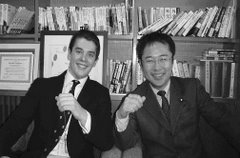
'Soft' Power
Any aficionado of the Japanese martial art, Judo, will have heard the phrase "柔能く剛を制す"("ju yoku gou o seisu"). In rough translation, this means "skilled softness overcomes brawn." In Judo, a small accomplished competitor can maneuver an opponent's weight in such a way that requires little brute strength to throw them. Originally coined by the Chinese philospher, Lao-zi, and much later recycled by the founder of Judo, Jigoro Kano, this short phrase has become a maxim for life.
In Foreign Policy, too, this proverb has a role. Despite the current US example, effective diplomacy does not have to rely on vast demonstrations of aggressive power. Bottom-up investment in the areas of cultural diplomacy and intelligence, combined with a commitment to multilateral institutions, has the potential to bear greater long-term fruit than unilateral military "shock and awe". Much of the success in Afghanistan, for example, was a result of the human relations built-up by British and American intelligence officers over a considerable length of time. A quick shower of gold, and an imposing military presence have neither secured Iraq in the short, or potentially, the long-term. If the 'brawn' is really necessary, it must only come after mastering the techniques of 'soft' power.
Japan, meanwhile, lingers at the cross-roads with Prime Minister Abe Shinzo screaming for constitutional revision. This is to give the Japanese - read: the Japanese 'Self-Defense' Forces - a clearer-cut role in the world. Yet is this really necessary? It is perfectly possible (if you believe thinkers such as Ozawa Ichiro or Ronald Dore) for Japan to fulfill collective security responsibliltes under the auspices of the UN with the current consitutional arrangement. With US unilateralism languishing in the doldrums, this might be an opportunity for Japan to lead the international community making use of her Constitution, instead of blaming it for somehow acting as a hindrance.
The Japanese often compare 'hard' and 'soft' governance to the "wind and the sun". On a winter's day, it is not the harsh wind that encourages us to take off our coats. Indeed, the more the wind blows the more we huddle our jackets round us. But, when the sun comes out we voluntarily shed our layers. Good governance does not necessarily mean killing things- 'soft' power can be a proactive policy too.
R J F Villar


